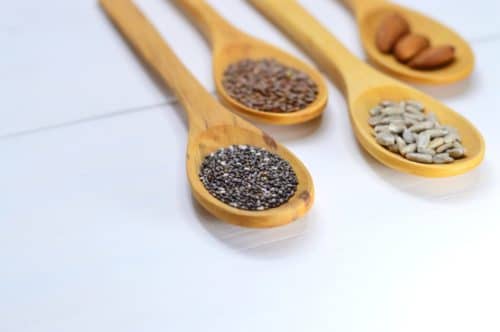Seed cycling is a holistic approach to hormone balance that uses four types of seeds to support the different phases of our monthly cycles. It’s thought to correct hormonal imbalance, relieve systems of PMS, increase fertility, and support the healing of conditions like ovarian cysts, polycystic ovary syndrome (PCOS), and endometriosis. The general thought is that food can heal us, that food is medicine.
Even for those who don’t suffer from a hormonal condition, PCOS, or endometriosis, seed cycling is still beneficial. During the two main phases of the menstrual cycle, the body secretes different, varying levels of hormones. When the body is in one phase, certain hormone levels drop, while others increase. Ingesting specific types of seeds can help balance out that drop and increase, naturally supporting the body as it goes through the natural phases of the menstrual cycle. Read on to find out all about seed cycling and why you should give it a try.

(Photo courtesy of Unsplash)
How to Seed Cycle
Four main seeds are used in cycling: pumpkin, flax, sunflower, and sesame seeds. Those are the seeds, now time for the cycling. “Cycling” refers to the rotation of the seeds between the two main divisions of the female body’s menstrual cycle. The two main phases are follicular and luteal.
During the follicular phase of the menstrual cycle, eat a helping of flax and pumpkin seeds daily. Alternately, practitioners should reach for sesame and sunflower seeds during the luteal phase.
See More: How Acupuncture Can Help With Fertility Issues + PMS
The Follicular Phase
The follicular phase of the menstrual cycle lasts about 14 days and starts on the day menstruation begins. During this phase, estrogen levels start out low, then readily spike as the body prepares to release an egg. As estrogen levels increase, so do luteinizing hormone levels, known as LH. Comparatively, decreasing estrogen levels stimulate the release of the follicle-stimulating hormone, known as FSH. Too much of an increase in estrogen can cause too much LH and too low an amount of estrogen can cause too much FSH. It’s clear that balancing estrogen levels is an important and tricky business.
The main goal is to keep estrogen levels balanced and in check. Then, in theory, LH and FSH levels will also be balanced.
The key to maintaining healthy levels of estrogen is supplementing with phytoestrogens. What are phytoestrogens? Phytoestrogens are a plant-based source of estrogen that adapts to the body’s natural estrogen. They “compute” what the body needs, such as more or less levels of estrogen, and they act accordingly.
So where does one get phytoestrogens? Flax seeds are high in lignans, which block excess estrogen production and bind to estrogen receptors to mimic naturally occurring estrogen in the body. Flax is also high in omega 3s, which is important for promoting anti-inflammation and supporting membrane function.
Pumpkin seeds are another source of phytoestrogens. Full of zinc, which gets the body ready for progesterone secretion in the luteal phase. Pumpkin seeds are also high in omega 3s.
The Luteal Phase
The luteal phase lasts about 10 days. The star of the luteal phase is progesterone. If a patient’s luteal phase lasts any less than 10 days, they might be suffering from low progesterone or fertility issues.
The main job of progesterone is to facilitate egg implantation and support the uterine lining. After ovulation, the luteal phase happens, which is defined by a drop in estrogen, FSH, and LH. As estrogen drops, progesterone spikes. If estrogen stays too high, that’s when PMS symptoms and pain associated with menstruation come into play.
Progesterone keeps estrogen levels steady. That’s why it’s crucial to support progesterone levels during the luteal phase. To do this, patients need a healthy helping of omega 6s. Omega 6 converts into gamma-linolenic acid (GLA) in the body, which works to reduce inflammation associated with PMS.
So where do you get omega 6? Sesame seeds are high in both omega 6 and lignans that keep both estrogen and progesterone levels in check. Sunflower seeds are high in selenium and omega 6. The selenium in sunflower seeds supports liver function. Liver function is crucial to preventing excess hormones, as it filters everything out. If the liver is blocked, your body may get to unhealthy levels of hormone excretion.
Read More: Egg Freezing: A Local Fertility Nurse Shares the 101
Dosing
Now that you know to eat flax and pumpkin seeds during your follicular phase (the day of your period and 13 days following after) and sesame and sunflower seeds in your luteal phase (the remaining 10 days of the monthly cycle), readers might be wondering about dosage.
The recommended quantity for seeds when cycling is one teaspoon of each seed per day. Patients can go up to one tablespoon of each seed, so two tablespoons per day, once a routine is established.
How to Consume the Seeds
When seed cycling, seeds should always be raw. They should be unroasted, unsalted, and unseasoned. If and when possible, try to opt for organic options. Raw seeds have their full medicinal properties. Roasted, salted, and/or seasoned seeds, unfortunately, have likely been stripped of many of their nutrients.
Many people agree the best way to seed cycle is through other foods. Unless that patient enjoys eating two tablespoons of pure seeds each day! Seeds can be added to smoothies, acai bowls, salads, soups, or grain bowls. But note: if adding your seed cycling seeds to warm foods, add them to the dish after cooking. Otherwise, the high temperatures will strip the nutrients.
Medical Disclaimer
Information in this post and on this website is provided for informational purposes only. The information is a result of practice experience and research by the author. This information is not intended as a substitute for the advice provided by your physician or other healthcare professional or any information contained on or in any product label or packaging. Do not use the information on this website for diagnosing or treating a health problem or disease, or prescribing medication or other treatment. Information and statements regarding dietary supplements have not been evaluated by the Food and Drug Administration and are not intended to diagnose, treat, cure, or prevent any disease. Always speak with your physician or another healthcare professional before taking any medication or nutritional, herbal, or homeopathic supplement, or using any treatment for a health problem.
Are you interested in trying seed cycling? Let us know in the comments below!









